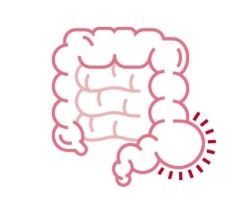What Causes It?
Low-fiber diet
Inadequate water intake (dehydration)
Lack of physical activity
Ignoring the urge to have a bowel movement
Changes in routine (travel, lifestyle changes)
Medications (opioids, iron supplements, antacids, antidepressants)
Irritable bowel syndrome (IBS)
Hormonal changes (pregnancy, thyroid disorders)
Neurological conditions (Parkinson’s disease, multiple sclerosis)
Colorectal obstruction or narrowing
Diabetes or other metabolic conditions
Signs & Symptoms
Infrequent bowel movements (fewer than 3 per week)
Hard, dry, or lumpy stools
Straining during bowel movements
Feeling of incomplete evacuation
Abdominal bloating and discomfort
Lower back pain
Decreased appetite in severe cases
